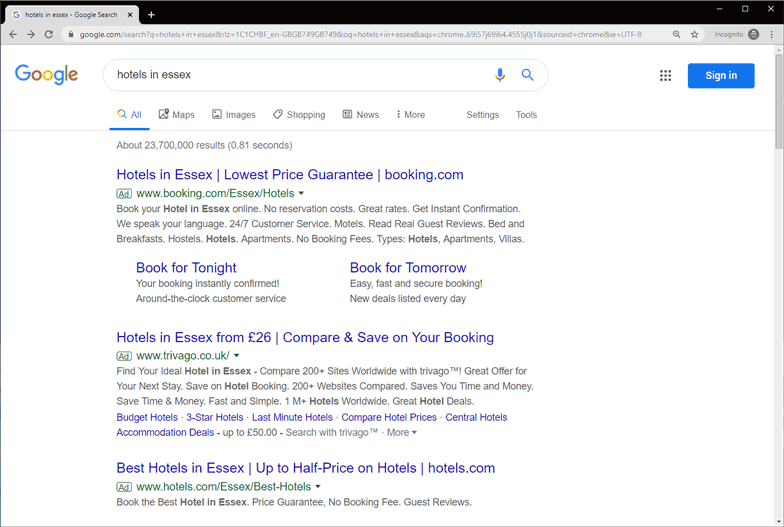Many hotel marketers and owners choose not to engage in search engine optimisation for one simple reason – they fear they can’t compete anymore against the vast blockade of Online Travel Agents (OTAs).
These paid and organic Google listings for OTAs like booking.com, hotels.com, and trivago.co.uk, plus Google’s own hotel listings, simply monopolise the first page.
When searching, not many of us go beyond that first page of results to find what they’re after – whether that’s down to us being too busy, or just plain lazy. With Google’s prime real estate consumed by the overwhelming buying power of OTAs, is there any point in independent hotels going up against them? Why even consider using organic SEO to gain traffic?
SEO isn’t dead, it just needs to change
The good news is that SEO is still worth it, but today’s unique scenario needs a different approach to be fruitful.

Long-tail keywords to the rescue
Long-tail keywords are niche search terms that are generally speaking more than 3 words long.
Sam Kusinitz at Hubspot explains the advantage long-tail keywords can give to your SEO, “Since they’re very specific, they allow you to rank highly in search results for specific topics relatively quickly while still gaining ground on head terms.”
By realigning your organic SEO strategy to target these long-tail searches, you can circumvent the competitive common search terms which are plagued by OTAs by gaining results in a more specific niche.
Blog posts, when optimised correctly, and Frequently Asked Questions pages are great fodder for long-tail traffic.
Answer questions
Answering consumer’s questions is something you should be doing anyway. When a user comes to your website they have a number of questions or objections that you need to answer to move them along the buying process. Answering these questions is great for SEO, providing some of the long-tail keyword searches you’re after, but that’s not the only benefit.
This question and answer mindset ties in nicely with the trajectory of search providers like Google. With more and more people speaking their search requests into smartphones and smart speakers, Google are investing a lot more into the “natural language search” element of their search algorithm.
Use your USPs
More esoteric marketing goals like building the character of your brand aren’t incompatible with this SEO approach, in fact, they play together nicely. By producing content that focuses on your unique selling points (USPs) you naturally build long-tail traffic and differentiate from OTAs targetting the more general terms.
For example, OTAs will target generic terms such as “hotels in Essex” but you could target based on your hotel’s unique offering with terms such as “Swedish massage experience in a country mansion” or “woodland afternoon tea”.
In addition to being more achievable, these niche searches come with much more intent to buy compared with the broader more generic searches.
Harness the power of your brand name
Naturally, most hotels have good rankings on Google for their own brand name, if not appearing in the number 1 spot. But this isn’t always the case so be sure that those already looking for you can find you.
This is an area particularly worth paying attention to as OTA presence seems to be more limited when you search by name, usually with only one paid listing between the customer and your website. Optimise your meta tags and Google My Business listing to make the most out of your presence here.
Keep an eye on Google
Google is adapting to the situation by toying with updates to their search algorithm, such as June 2019’s Diversity Update. This update was aimed at refining search results where one particular site, such as an OTA, was dominating the first page with multiple listings. Though this move is promising, it certainly hasn’t fixed the problem, and with Google themselves developing their own OTA offering, things may get more crowded on that first page.
In conclusion
While searchers do naturally trust authentic organic listings and may have become blind to promoted listings, the sheer weight of OTAs taking up all spots on Google’s first page, both paid and organic, is concerning.
Dropping OTAs isn’t usually the answer, they’re a great channel for helping new customers discover your hotel.
The answer is to adapt and use organic SEO consistently, in sync with your other marketing channels. Focus on gaining good rankings for a broad range of lower value search terms, rather than one unattainably high-value search term. Produce, optimise and share good content that doesn’t just promote you as “a hotel in a place”, but as the beautifully unique range of services and experiences you can offer – this will ultimately, naturally attract long-tail search traffic.



